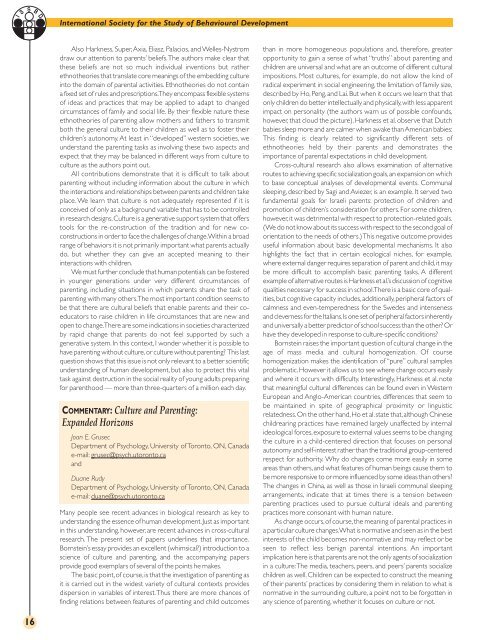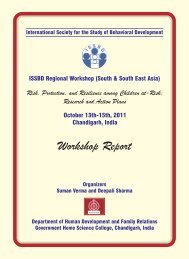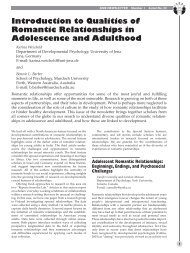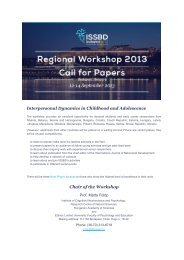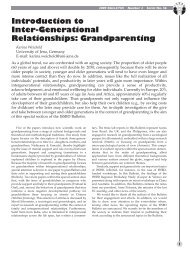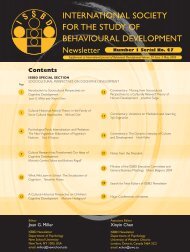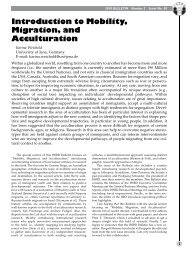Culture and Parenting - International Society for the Study of ...
Culture and Parenting - International Society for the Study of ...
Culture and Parenting - International Society for the Study of ...
You also want an ePaper? Increase the reach of your titles
YUMPU automatically turns print PDFs into web optimized ePapers that Google loves.
S<br />
I<br />
S<br />
B<br />
D<br />
<strong>International</strong> <strong>Society</strong> <strong>for</strong> <strong>the</strong> <strong>Study</strong> <strong>of</strong> Behavioural Development<br />
Also Harkness, Super,Axia, Eliasz, Palacios, <strong>and</strong> Welles-Nystrom<br />
draw our attention to parents’ beliefs.The authors make clear that<br />
<strong>the</strong>se beliefs are not so much individual inventions but ra<strong>the</strong>r<br />
ethno<strong>the</strong>ories that translate core meanings <strong>of</strong> <strong>the</strong> embedding culture<br />
into <strong>the</strong> domain <strong>of</strong> parental activities. Ethno<strong>the</strong>ories do not contain<br />
a fixed set <strong>of</strong> rules <strong>and</strong> prescriptions.They encompass flexible systems<br />
<strong>of</strong> ideas <strong>and</strong> practices that may be applied to adapt to changed<br />
circumstances <strong>of</strong> family <strong>and</strong> social life. By <strong>the</strong>ir flexible nature <strong>the</strong>se<br />
ethno<strong>the</strong>ories <strong>of</strong> parenting allow mo<strong>the</strong>rs <strong>and</strong> fa<strong>the</strong>rs to transmit<br />
both <strong>the</strong> general culture to <strong>the</strong>ir children as well as to foster <strong>the</strong>ir<br />
children’s autonomy. At least in “developed” western societies, we<br />
underst<strong>and</strong> <strong>the</strong> parenting tasks as involving <strong>the</strong>se two aspects <strong>and</strong><br />
expect that <strong>the</strong>y may be balanced in different ways from culture to<br />
culture as <strong>the</strong> authors point out.<br />
All contributions demonstrate that it is difficult to talk about<br />
parenting without including in<strong>for</strong>mation about <strong>the</strong> culture in which<br />
<strong>the</strong> interactions <strong>and</strong> relationships between parents <strong>and</strong> children take<br />
place. We learn that culture is not adequately represented if it is<br />
conceived <strong>of</strong> only as a background variable that has to be controlled<br />
in research designs.<strong>Culture</strong> is a generative support system that <strong>of</strong>fers<br />
tools <strong>for</strong> <strong>the</strong> re-construction <strong>of</strong> <strong>the</strong> tradition <strong>and</strong> <strong>for</strong> new coconstructions<br />
in order to face <strong>the</strong> challenges <strong>of</strong> change.Within a broad<br />
range <strong>of</strong> behaviors it is not primarily important what parents actually<br />
do, but whe<strong>the</strong>r <strong>the</strong>y can give an accepted meaning to <strong>the</strong>ir<br />
interactions with children.<br />
We must fur<strong>the</strong>r conclude that human potentials can be fostered<br />
in younger generations under very different circumstances <strong>of</strong><br />
parenting, including situations in which parents share <strong>the</strong> task <strong>of</strong><br />
parenting with many o<strong>the</strong>rs.The most important condition seems to<br />
be that <strong>the</strong>re are cultural beliefs that enable parents <strong>and</strong> <strong>the</strong>ir coeducators<br />
to raise children in life circumstances that are new <strong>and</strong><br />
open to change.There are some indications in societies characterized<br />
by rapid change that parents do not feel supported by such a<br />
generative system. In this context, I wonder whe<strong>the</strong>r it is possible to<br />
have parenting without culture,or culture without parenting? This last<br />
question shows that this issue is not only relevant to a better scientific<br />
underst<strong>and</strong>ing <strong>of</strong> human development, but also to protect this vital<br />
task against destruction in <strong>the</strong> social reality <strong>of</strong> young adults preparing<br />
<strong>for</strong> parenthood — more than three-quarters <strong>of</strong> a million each day.<br />
COMMENTARY: <strong>Culture</strong> <strong>and</strong> <strong>Parenting</strong>:<br />
Exp<strong>and</strong>ed Horizons<br />
Joan E. Grusec<br />
Department <strong>of</strong> Psychology, University <strong>of</strong> Toronto, ON, Canada<br />
e-mail: grusec@psych.utoronto.ca<br />
<strong>and</strong><br />
Duane Rudy<br />
Department <strong>of</strong> Psychology, University <strong>of</strong> Toronto, ON, Canada<br />
e-mail: duane@psych.utoronto.ca<br />
Many people see recent advances in biological research as key to<br />
underst<strong>and</strong>ing <strong>the</strong> essence <strong>of</strong> human development.Just as important<br />
in this underst<strong>and</strong>ing, however, are recent advances in cross-cultural<br />
research. The present set <strong>of</strong> papers underlines that importance.<br />
Bornstein’s essay provides an excellent (whimsical?) introduction to a<br />
science <strong>of</strong> culture <strong>and</strong> parenting, <strong>and</strong> <strong>the</strong> accompanying papers<br />
provide good exemplars <strong>of</strong> several <strong>of</strong> <strong>the</strong> points he makes.<br />
The basic point,<strong>of</strong> course,is that <strong>the</strong> investigation <strong>of</strong> parenting as<br />
it is carried out in <strong>the</strong> widest variety <strong>of</strong> cultural contexts provides<br />
dispersion in variables <strong>of</strong> interest.Thus <strong>the</strong>re are more chances <strong>of</strong><br />
finding relations between features <strong>of</strong> parenting <strong>and</strong> child outcomes<br />
than in more homogeneous populations <strong>and</strong>, <strong>the</strong>re<strong>for</strong>e, greater<br />
opportunity to gain a sense <strong>of</strong> what “truths” about parenting <strong>and</strong><br />
children are universal <strong>and</strong> what are an outcome <strong>of</strong> different cultural<br />
impositions. Most cultures, <strong>for</strong> example, do not allow <strong>the</strong> kind <strong>of</strong><br />
radical experiment in social engineering, <strong>the</strong> limitation <strong>of</strong> family size,<br />
described by Ho,Peng,<strong>and</strong> Lai.But when it occurs we learn that that<br />
only children do better intellectually <strong>and</strong> physically,with less apparent<br />
impact on personality (<strong>the</strong> authors warn us <strong>of</strong> possible confounds,<br />
however, that cloud <strong>the</strong> picture). Harkness et al. observe that Dutch<br />
babies sleep more <strong>and</strong> are calmer when awake than American babies:<br />
This finding is clearly related to significantly different sets <strong>of</strong><br />
ethno<strong>the</strong>ories held by <strong>the</strong>ir parents <strong>and</strong> demonstrates <strong>the</strong><br />
importance <strong>of</strong> parental expectations in child development.<br />
Cross-cultural research also allows examination <strong>of</strong> alternative<br />
routes to achieving specific socialization goals,an expansion on which<br />
to base conceptual analyses <strong>of</strong> developmental events. Communal<br />
sleeping, described by Sagi <strong>and</strong> Aviezer, is an example. It served two<br />
fundamental goals <strong>for</strong> Israeli parents: protection <strong>of</strong> children <strong>and</strong><br />
promotion <strong>of</strong> children’s consideration <strong>for</strong> o<strong>the</strong>rs. For some children,<br />
however,it was detrimental with respect to protection-related goals.<br />
(We do not know about its success with respect to <strong>the</strong> second goal <strong>of</strong><br />
orientation to <strong>the</strong> needs <strong>of</strong> o<strong>the</strong>rs.) This negative outcome provides<br />
useful in<strong>for</strong>mation about basic developmental mechanisms. It also<br />
highlights <strong>the</strong> fact that in certain ecological niches, <strong>for</strong> example,<br />
where external danger requires separation <strong>of</strong> parent <strong>and</strong> child,it may<br />
be more difficult to accomplish basic parenting tasks. A different<br />
example <strong>of</strong> alternative routes is Harkness et al.’s discussion <strong>of</strong> cognitive<br />
qualities necessary <strong>for</strong> success in school.There is a basic core <strong>of</strong> qualities,but<br />
cognitive capacity includes,additionally,peripheral factors <strong>of</strong><br />
calmness <strong>and</strong> even-temperedness <strong>for</strong> <strong>the</strong> Swedes <strong>and</strong> intenseness<br />
<strong>and</strong> cleverness <strong>for</strong> <strong>the</strong> Italians.Is one set <strong>of</strong> peripheral factors inherently<br />
<strong>and</strong> universally a better predictor <strong>of</strong> school success than <strong>the</strong> o<strong>the</strong>r? Or<br />
have <strong>the</strong>y developed in response to culture-specific conditions?<br />
Bornstein raises <strong>the</strong> important question <strong>of</strong> cultural change in <strong>the</strong><br />
age <strong>of</strong> mass media <strong>and</strong> cultural homogenization. Of course<br />
homogenization makes <strong>the</strong> identification <strong>of</strong> “pure” cultural samples<br />
problematic.However it allows us to see where change occurs easily<br />
<strong>and</strong> where it occurs with difficulty. Interestingly, Harkness et al. note<br />
that meaningful cultural differences can be found even in Western<br />
European <strong>and</strong> Anglo-American countries, differences that seem to<br />
be maintained in spite <strong>of</strong> geographical proximity or linguistic<br />
relatedness.On <strong>the</strong> o<strong>the</strong>r h<strong>and</strong>,Ho et al.state that,although Chinese<br />
childrearing practices have remained largely unaffected by internal<br />
ideological <strong>for</strong>ces,exposure to external values seems to be changing<br />
<strong>the</strong> culture in a child-centered direction that focuses on personal<br />
autonomy <strong>and</strong> self-interest ra<strong>the</strong>r than <strong>the</strong> traditional group-centered<br />
respect <strong>for</strong> authority. Why do changes come more easily in some<br />
areas than o<strong>the</strong>rs,<strong>and</strong> what features <strong>of</strong> human beings cause <strong>the</strong>m to<br />
be more responsive to or more influenced by some ideas than o<strong>the</strong>rs?<br />
The changes in China, as well as those in Israeli communal sleeping<br />
arrangements, indicate that at times <strong>the</strong>re is a tension between<br />
parenting practices used to pursue cultural ideals <strong>and</strong> parenting<br />
practices more consonant with human nature.<br />
As change occurs,<strong>of</strong> course,<strong>the</strong> meaning <strong>of</strong> parental practices in<br />
a particular culture changes.What is normative <strong>and</strong> seen as in <strong>the</strong> best<br />
interests <strong>of</strong> <strong>the</strong> child becomes non-normative <strong>and</strong> may reflect or be<br />
seen to reflect less benign parental intentions. An important<br />
implication here is that parents are not <strong>the</strong> only agents <strong>of</strong> socialization<br />
in a culture:The media, teachers, peers, <strong>and</strong> peers’ parents socialize<br />
children as well. Children can be expected to construct <strong>the</strong> meaning<br />
<strong>of</strong> <strong>the</strong>ir parents’ practices by considering <strong>the</strong>m in relation to what is<br />
normative in <strong>the</strong> surrounding culture, a point not to be <strong>for</strong>gotten in<br />
any science <strong>of</strong> parenting, whe<strong>the</strong>r it focuses on culture or not.<br />
16


